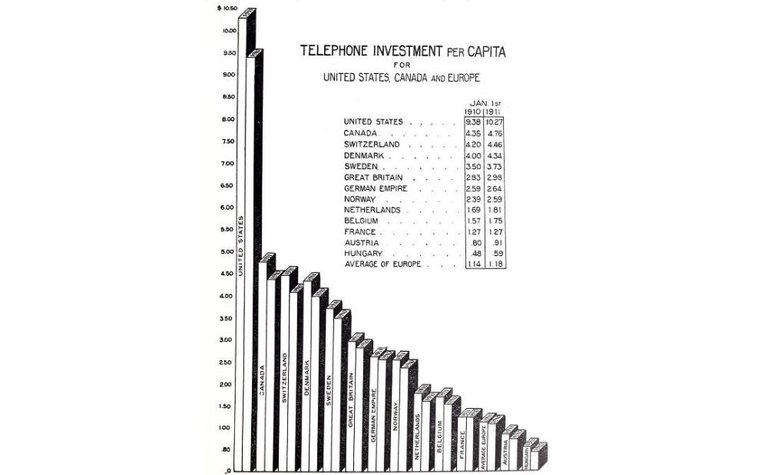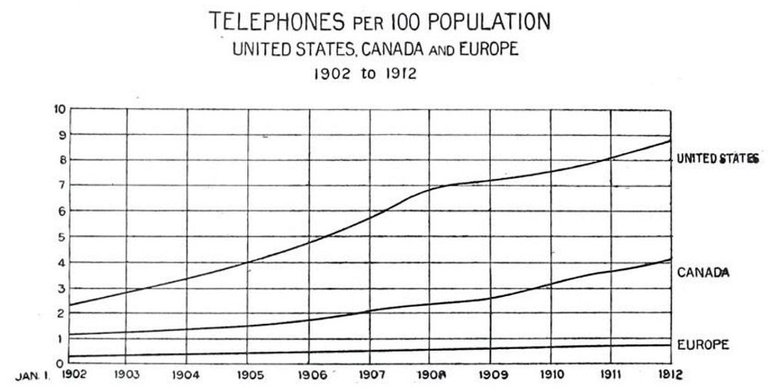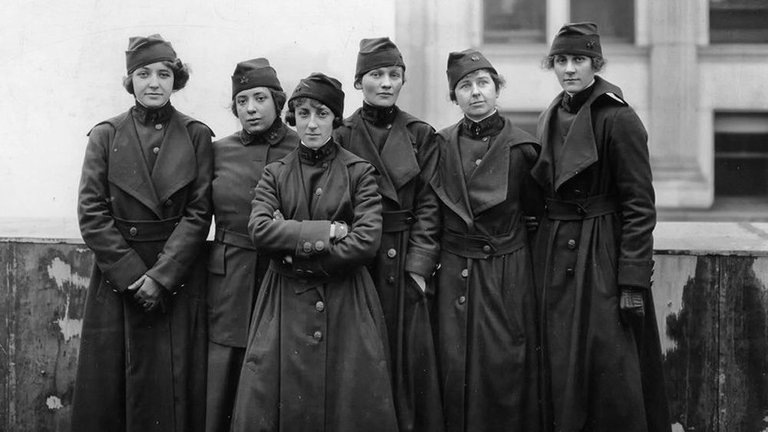Whose telephone technology would win?
Victory was hardly a sure thing before the turn of the 20th century when the United States went toe-to-toe with Europe. Competition with the Old Country had been stiff and the results could have gone either way. But soon it became abundantly clear that the US would win. As readers learned in a recent post, by 1912 the world had nearly 12.5 million telephones, 67% of which were Yankee owned. And the number of American phone conversations approached 15 billion—nearly three times what Europe could claim.

How did the US manage to pull ahead?
Investment in infrastructure made a major difference, that alone didn’t do the trick. The Americans needed to somehow maximize the return on their investment. To accomplish this, they leveraged their innate inclination for abruptness and put their newfound obsession with efficiency to the test.
Polite, old-world Europe didn’t have a chance.

“Courtesy Too Costly”
Forget civility, urged the telephone executives. They advocated dropping the vapid “Hello" greeting and the ever-obsequious “please.” The stakes were too high for such niceties.
“Courtesy Too Costly” admitted a headline in the Philadelphia Inquirer September 5, 1907:
“Hereafter the 450 girl operators of the Keystone Telephone Company of this city will not say ‘please’ to the subscribers and subscribers have been requested not to say ‘please’ to the operators.” A. J. Ulrich, Keystone’s top traffic manager had looked into the matter and found that patrons making calls and operators answering them deployed “'please' 900,000 times each and every day. “Estimating that it requires half a second to say the word, 7,500 minutes are consumed every 24 hours, which is equal to 125 hours lost every day by the use of the word.”
So the Keystone Telephone Company banished "please.” And Ulrich insisted “both the girls and the subscribers are happy with the new arrangement.”

That left "Hello!"—the other banal word inhibiting American progress.
In 1910, AT&T tried to forbid this enemy of the bottom line, suggesting that starting a conversation with “hello” was somehow vulgar. Neither the operators nor the public bought that argument. “Hello” grew into the universal telephonic greeting and AT&T soon found itself promoting the nickname “Hello-Girls” for the 223 American switchboard operators, soldiers on the battlefields of France.
World War I had given winning an altogether different meaning.

Fascinating read. Corporations again walk over society and culture in the race for profit.
American corporate culture got it's foothold in late 19th-century. Back then (in Philadelphia, anyway) when people referred to the president, everyone knew they meant not the guy in the White House but the guy in the corner office at the Pennsylvania Railroad.
Then it took the opportunity presented by WWII.
Congratulations @kenfinkel! You have completed some achievement on Steemit and have been rewarded with new badge(s) :
Click on any badge to view your own Board of Honor on SteemitBoard.
For more information about SteemitBoard, click here
If you no longer want to receive notifications, reply to this comment with the word
STOP